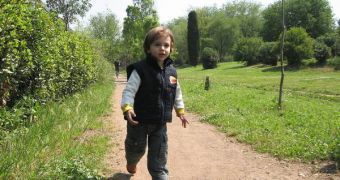Every single parent out there knows that toddlers have their own way of interpreting things, and that they seem to be paying little attention to what they are told. Their behavior may have given birth to the idea that words enter their head through one year and get out immediately through the other one. Now, new scientific studies come to show that toddlers' brains actually seem to be storing the information they receive and using it later, instead of right away.
That is to say, they hear and process the data they perceive in real time, but the words of their parents seem to fall on deaf ears because the infants' brains simply act in mysterious ways. “I went into this study expecting a completely different set of findings. There is a lot of work in the field of cognitive development that focuses on how kids are basically little versions of adults trying to do the same things adults do, but they're just not as good at it yet. What we show here is they are doing something completely different,” University of Colorado in Boulder (UCB) psychology professor Yuko Munakata explains.
The experts say that, while older children around the age of 8 or more are able to predict the outcome of a situation to a certain extent, toddlers are not and are forced to analyze a situation by looking in retrospect to their previous action. This has been proven by a new experiment, in which scientists placed several 3-year-olds and some 8-year-olds in front of computer screens, and asked them to play an association game. They had to press a smiley face when a certain figure appeared on the screen, and a sad one when a second shape was displayed.
“The older kids found this sequence easy, because they can anticipate the answer before the object appears. But preschoolers fail to anticipate in this way. Instead, they slow down and exert mental effort after being presented with the watermelon, as if they're thinking back to the character they had seen only after the fact,” doctoral student Christopher Chatham, who has also been part of the new study, which has appeared in this week's issue of the journal Proceedings of the National Academy of Sciences, adds.
“For example, let's say it's cold outside and you tell your 3-year-old to go get his jacket out of his bedroom and get ready to go outside. You might expect the child to plan for the future, think 'OK it's cold outside so the jacket will keep me warm.' But what we suggest is that this isn't what goes on in a 3-year-old's brain. Rather, they run outside, discover that it is cold, and then retrieve the memory of where their jacket is, and then they go get it,” he goes on to explain.
“If you just repeat something again and again that requires your young child to prepare for something in advance, that is not likely to be effective. What would be more effective would be to somehow try to trigger this reactive function. So don't do something that requires them to plan ahead in their mind, but rather try to highlight the conflict that they are going to face. Perhaps you could say something like 'I know you don't want to take your coat now, but when you're standing in the yard shivering later, remember that you can get your coat from your bedroom',” Munakata concludes.

 14 DAY TRIAL //
14 DAY TRIAL //